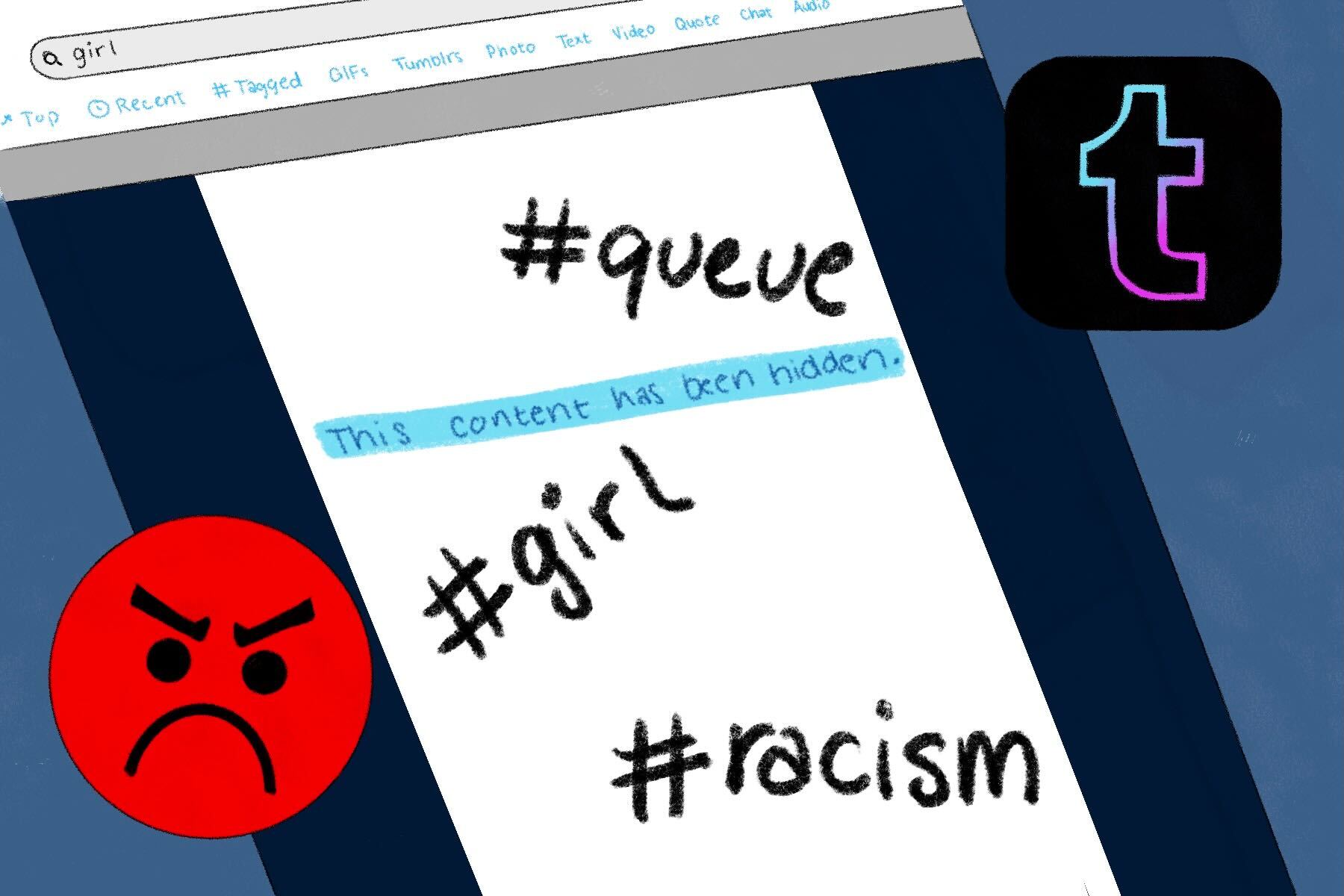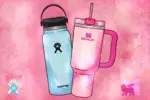What do girls, weed, single dads and Eugene Levy all have in common? Well, they’ve all recently been announced as part of a large list of tags that will be banned on Tumblr’s iOS mobile app at Apple’s discretion. While some banned tags are reasonable things to censor and moderate, many of the tags confused the internet, which led to an inadvertent swell of memes and user camaraderie. Just as loyal Tumblr users were feeling safe in the sanctity of their shabby but unique social media platform of choice, Apple came out of the shadows to remind everyone the big companies are still in charge. No matter how unkillable and cockroach-like Tumblr may seem, it is still vulnerable to staff reform, especially the haphazard and unpopular kind it’s experienced over the years. The tag ban, or “tagpocalypse” according to some users, is just the most recent iteration of Tumblr’s missteps with its remaining user base.
The Tag Ban
In late December, people all around the world woke up to the shocking news, or, rather, the slew of memes and chatter across multiple social media sites proclaiming that something had gone down over on Tumblr dot com. Whether it was loyal, decade-long Tumblr bloggers or people on Twitter peeking over the border of their own app, everybody watched in confusion as Tumblr announced its removal of hundreds of tags, from the obvious “penis,” “murder” and “pedophilia,” to the seemingly harmless “girl,” “My post,” “Reblog,” “Selfie” and “Bald.” Overall, they banned 446 total tags, which Tumblr user bannedtags compiled in one big Google doc. User bugleaf notes, “Tumblr be collecting random tags to ban like they are Pokémon cards.”
On Dec. 21, following vocal backlash to the unexplained ban, Tumblr developers clarified their intent to expand “the definition of what sensitive content is as well as the way you access it in order to comply with [Apple’s] guidelines.” They also noted that some searches would simply produce fewer results, while others would produce none at all. This is an obvious attempt to avoid getting kicked off the app store (again).
The First Content Raid
OG Tumblrinas will recall the first major Tumblr raid, also known as the great porn ban of 2018. This is the first time Tumblr lost a battle to Apple in a major way. Until this moment, pornography was a thriving product and community on Tumblr. The multimedia blogging platform included porn in every format, from text, to photo, to audio, to video. This made for some inspired and artistic spank banks. Sex was more than just the dark underbelly of the platform, however, and a legitimate NSFW, or not-safe-for-work, community girded the site’s user base.
However, in December 2018, almost exactly three years prior to the current tag ban, Tumblr was kicked off the iOS App Store over the discovery of child pornography hosted on the microblogging site. It was a necessary issue for the platform to address, but in their attempt to immediately resolve it, they proceeded to ban all NSFW content. While apps like OnlyFans are increasing the number of digital spaces built for sex workers, many were upset by Tumblr’s sudden crackdown on their livelihood.
Following the porn ban, Tumblr experienced a mass exodus, with many deciding then and there that the site was “over” and “dead.” The site lost a third of its user base and has never fully recovered. Since then, the Tumblr staff have become the antagonists of their own narrative, no longer joking with users in a playful, chill way, but surfacing every now and then to enact bizarrely misguided attempts at reforming the user-proclaimed “hellsite.” In 2018, everyone posted memes about the irony of Tumblr’s attack against female nipples when Nazi blogs still existed. With the most recent tag ban, people once again believe it fails to fix its core content issues. Again, it seems like Tumblr is blindly slapping on regulatory Band-Aids instead of addressing its root problems.
User Concerns
While many of the banned tags do aim to root out pornography, gore and content that encourages self-harm, users have pointed out that removing tags may paradoxically expose more people to harmful or triggering content. Without tags, there is no way to filter posts like before. Users like comet-iviarini tagged Tumblr’s staff account directly to say, “Hey @staff, banning content-and trigger warnings just means that you can’t tag sensitive or triggering posts, which means that people who want to avoid specific content are MORE likely to see it, so how exactly do you think this update is going to make your app safer?”
User badolmen mentions the accessibility implications, saying, “So, so cool how tumblr, one of the few social medias with widespread use of image descriptions and tagged trigger warnings, has had their platform made more hostile to the visually impaired and those seeking to avoid triggers.”
Posts found under tags about topics such as “racism” most often exist to promote productive conversation on those topics. For instance, posts under the tag #antisemitism commonly involve the Jewish community describing their experiences and seeking to educate others. User eivor-wolfkissed sees this censorship as sinister, writing, “It isn’t about protection. It’s about silencing people talking about the discrimination they face on social media. For some people, it is the only safe outlet they have to vent about discrimination of any kind.”
User artistinthebluebox echoes the sentiment: “The new word bans on ios are incredibly messed up. They themselves won’t prevent harmful content; instead they will prevent people from making tumblr safer for marginalized communities. The tags listed harm our queer community, disabled and mentally ill community, our people of color, and more. This will silence them from being able to express their experiences in one of the only comfortable spaces on the internet.”
Others didn’t understand why Tumblr had to stick with iOS. “If iOS is going to be a moldy walnut about content on Tumblr, fine. Then Tumblr should just be offering its own full version of the app for download from a browser so that there are no restrictions being enforced by Apple (or any other major tech company because Android isn’t totally innocent either afaik),” user imgonnabitegod wrote. “Just. Make an independent version of the app. That’s it. It’d be so easy. F—ing do it.”
The Absurdity
Whether or not all the censorship concerns are valid, it’s impossible to deny how silly many of the tags are. For instance, they banned the tags for Schitt’s Creek star “Eugene Levy,” as well as “Alec Lightwood,” a character in “The Mortal Instruments” series. Matthew Daddario, who plays Lightwood in the recent “Shadowhunters” TV adaptation, went to Twitter to express his own confusion. He asked the question on everyone’s mind: “Was this list created by a machine process, where you gathered the words most often associated with content that shouldn’t be on your site, or was it put together by a team sitting around a desk? Depending on the answer to that, I have further questions.”
If it's the first, I don't want to know. If it's the second, I NEED to know. Thank you for your time. This is very fun for me so any info is appreciated. https://t.co/MJAG6y32xC
— Matthew Daddario (@MatthewDaddario) December 27, 2021
Users phil-dwyer-stan-account gave their opinion on singling out fictional characters, saying, “Yeah, the tumblr tag ban is awful and censorship is horrible but if they’re going to ban specific characters in the tags they should ban Edward Cullen.”
Users may no longer peacefully celebrate their love of “Alice May,” the voice of Peppa Pig, or keep their mutuals’ feed clear of an extra “Long post.” Other tags like “queue” and “queued” — used to denote which posts are scheduled ahead of time — or “asked” — which refers to Tumblr’s own “ask” feature — performed a seemingly neutral, organizational function for big and active blogs. Ironically, their removal will disorder the site instead of cleaning it up.
Despite the chaos (or because of it), people had fun memeing on the event, using banned tags like #girl to layer the humor of existing memes. They posted things like “[REDACTED] help” and “[REDACTED] just wanna have fun.”
Who’s In Charge Here?
Despite being “dead” for years now, Tumblr has maintained an active blogging community for those left. In recent years, users have felt safer using a site that’s been “forgotten about,” seeing as they don’t like the reform and regulation happening on apps like Instagram — big acquisitions like Facebook’s purchase of the image-sharing platform do not bode well for user experience, after all. For years, Tumblr users have been happily forgotten, so the sudden experimentation with the site’s formula doesn’t sit well with anyone. It draws attention to the overpowered regulatory ability a few big tech companies have on all kinds of apps. This leaves social media sites of all kinds vulnerable to the policy whims of Apple, Google and Amazon (which runs AWS, one of the world’s largest web hosting services).
Tumblr users aren’t sure whether to point their fingers at Tumblr itself or Apple, but some say both are handling everything incompetently. User wetwareproblem writes, “Tumblr, in its infinite !wisdom, appears to have completely forgotten the 2018 Titty Ban and decided the best solution was to let a poorly-trained ML algo loose on the production environment without oversight,” and, “The key takeaway here: Everyone can stop saying ‘Don’t blame tumblr, this was apple’s call’ or ‘don’t blame Apple for tumblr’s typical user hostility.’ They both suck and both played a part.”
Users like wetwareproblem see this as a “user-hostile” move compounded by capitalism, saying, “Expect to see a lot more of it on the corporate internet as time goes on. Users are a commodity, not a clientèle; as such, your needs do not, will not, and cannot matter in the face of lost revenue.”
A Heavenly Hellsite
Tumblr gets a bad rep, especially for spectacles like the tag ban, but it still has so much to offer. The feed remains chronological instead of algorithmic, like Instagram’s, and its multimedia capability has always been a huge draw. Posts aren’t recommended or buried based on likes and timing, you can still make back-to-back post jokes and you can see when a mutual is going through a manic reblogging session late at night/early in the morning. Ironically, the ability to filter content through tags was another feather in the site’s cap before this ban.
While sometimes comically overused, the tagging system meant users could post freely without accidentally triggering a mutual, and it gave them the freedom to indulge their hyperfixations. If someone is sick of seeing “Succession” GIF sets, they can simply block that tag, and you can go on posting about it to your heart’s content on your main account. Now, however, even this advantage is being turned in on itself in Tumblr’s latest self-destructive agenda.
Still, despite its comically bad governance, Tumblr is one of the best sites left for curating special interests and self-expression. As more and more apps adopt one another’s features and blend together, Tumblr remains unique in its approach. If Tumblr is a sinking ship, there are still plenty willing to go down with it; user fxa says, “no matter what happens to tumblr i am not going to use another social media. i don’t care what kind of insufferable updates they throw at us or what other platforms come along. if this place shuts down you’re never hearing from me again and it’s really just that simple.”

















